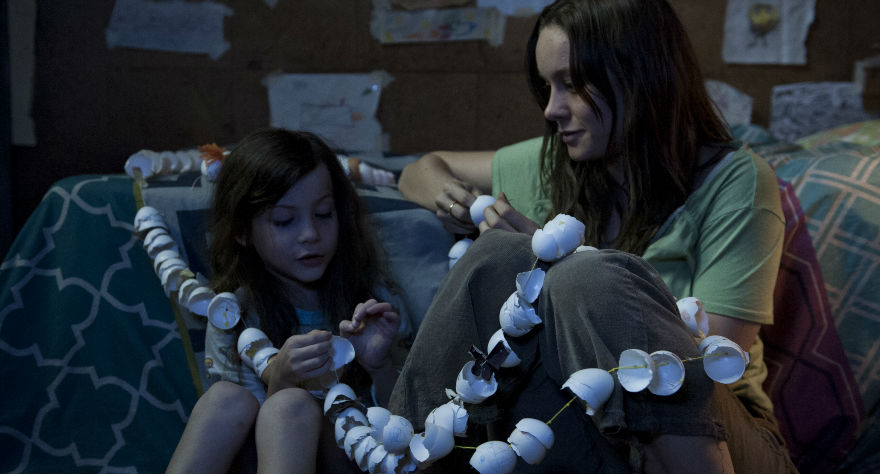‘Room’ Director Lenny Abrahamson On Brie Larson, Making Challenging Films

Lenny Abrahamson‘s Room, adapted by Emma Donoghue from her own novel, is an imaginative examination of parent-child dynamics that’s been garnering the Irish director wide praise. Also receiving her share of adulation is Brie Larson, who plays Ma, a single mother who lives confined in a little room with her son, Jack (Jacob Tremblay). “Room,” as they lovingly call their humble abode, is the only world Jack’s ever known, but Ma wants more for her son’s life and hatches a plan to deceive their captor and break out of Room and into the larger outside world.
Room‘s brilliance is all but undeniable. Emotional, urgent, unpredictable, sweet, frightening—the movie is super complex and deceptively simple, not to mention it harbors arguably Larson’s best performance yet. Tremblay matches his older co-star’s talent and, amazingly, acts as the film’s anchor at eight years old.
I spoke to Abrahamson about the film in a roundtable interview during his visit to San Francisco at the Ritz Carlton Hotel. Room is out now in select cities, opens in San Francisco tomorrow, October 23rd, and expands wide November 6th.

You’ve talked about a letter you wrote to Emma Donoghue and the pitfalls a director could face in adapting this story.
Lenny: I thought there were two opposite ways you could go wrong making this film. On one hand, you could make something terribly sentimental where you’re just button-pushing and manipulating the audience to fake emotion. In the other direction, if you go for tough, gritty, bleak and hardcore, you end up with something that’s a bit exploitative and doesn’t capture what the novel’s really about. It isn’t about incarceration. To tell the story as if it were about the incarceration is to tell the story on the terms the abuser sets; we’re telling the story on the terms the survivors set.
I also felt there would be a temptation—given that the novel is told from the point of view of the little boy—to try to find some device or trick or technique to directly copy that to film. Computer graphic techniques, ways to make more magical the things that Jack talks about—somehow externalizing the way the child is thinking. I thought, all that would do is distance the audience from what is the strongest aspect of this film, which is a sense of a real encounter with those characters. You trust an audience brings this empathetic tenderness to characters if they’re well shown, and that type of emotion is way more real and lasting than the shock or sentiment.
I had a wonderful experience with the film because I had not heard about the book or seen the trailer. I went in totally cold. When that pivotal moment comes halfway through the movie I thought, “Well, I guess the ending is coming soon.” I loved not knowing what was going to happen next. Is that the ideal way you’d like audiences to watch the film, knowing essentially nothing going in?
Lenny: Yeah! I think in an ideal world, everybody would walk into a theater without knowing anything about the movie they’re going to see. Obviously there are many reasons why we have to tell people a little bit about the film. Particularly in the case of Room, if all you knew was the very bare outline, you might think, “That sounds a little bit too tough for me.” In fact, what it is is a very uplifting and life-affirming film. To tell that to people is pretty important, I think. But you are still my ideal viewer. If I was Stalin and I could make people go and see my film, I wouldn’t tell them anything about the story! [laughs] Then the film gets to play with your expectations.
Some people mistake the movie’s setting as post-apocalyptic in the first half.
Lenny: One of the great things about cinema is, once a person buys a ticket to the theater, you now you’ve got them for a while. It’s not like TV where they have the remote in their hand. One of the great advantages of seeing a movie in a theater is that it allows the filmmaker a larger canvas to place you in the world at their own pace. There’s something about that opening that puts you in the head of the child. You wake up and you don’t learn anything he’s not bringing you. If at the beginning you really established what the world was and then went in, you’d have already created this external perspective.
What I wanted to do was tie you to the boy. You’re getting these hints that, in the world of his mother, there’s more tension and danger than he’s aware of. That’s really the condition of all parents and children. This is an extreme version of it so that you can really examine what parenthood is all about. Loving parents constantly present one face to their child, which is almost always confident and reassuring, trying to make things that are worrying to them not worrying to the children. In other words, there is an outside world and an inside world, and the inside world is the face you show to your child. Those are the kinds of little permeable barriers that we were really fascinated with. This is a film about being a child and having children and growing up. The rest of it is a way of unlocking some universal aspects of those things by picking this remarkable and unusual situation.
Brie’s career is really starting to catch fire. I think there’s a lot of warmth and intellect to her that makes her special. What makes her special to you?
Lenny: I think you said it. She started acting when she was seven. That process, that transition from who you are and into character, it’s like riding a bicycle to her because she’s done it so many times. She doesn’t have to think about it. What’s great about that is that she has a lightness of touch as an actor. She’s not walking around super intense on set, unable to make eye contact, desperate to keep in character for fear that if she steps out she’ll lose it. She has it so firmly in her grasp. That means, as a director, after you call cut, the person that comes back to you is ready to talk about what she’s just done, she’s ready to talk about alternatives. She’s not saying she can’t play it any other way because “this is how I feel it.” She can feel it lots of ways. She’s a shape-shifter in that way.
Sometimes we have a tendency to believe that the super-intense actors are the only ones who are deep. That’s absolutely not true. I don’t think I’ve seen a stronger lead performance for a long time than Brie in this film, and yet she manages to still participate in the overall conversation about the film. She’s very warm and very present. That’s very important because we’ve got a little boy on set who’s paired with her for so many scenes in the film. You can imagine if she was just flouncing off to her trailer when we called cut or if she didn’t want to play with him. You’d lose what makes that relationship special onscreen. She’s remarkable.
Cinematographer Danny Cohen is very talented. There are some clear cinematic challenges the first half of the film presents. What were some of the challenges the second half presented?
Lenny: That’s interesting. As soon as we got out of Room we missed it a bit, sort of like the characters in the film. In the second half I think the challenge was to over-express the largeness of the world. It’s really tempting to say, “Now we’re out of Room. Let’s have really wide shots.” We shot very naturally when we got out of Room. We don’t use super wide lenses or anything like that. As an audience, you’ve already been inside for 45 minutes. I wanted to say, the world as it is, without me exaggerating it, is pretty amazing. If I exaggerated, I’d be cheating. I wouldn’t be showing you something real. For me it’s always about making those little hints invisible to the audience. As soon as people think they’re being told something, it’s just less powerful.
The Room world is Jake’s normal world. Once you get into the outside world, how do you deal with how overwhelming that is for him? We did use some techniques. We were more likely to do some point-of-view stuff. If he’s sitting on Ma’s knee, we take shots from his point of view through her hair. The cutting style is a little more disjointed. His attention is on these details. Why can kids be irritating? Clearly, in this room, the focus is us talking. Come on, it’s obvious! A kid is just as interested in [some other little thing in the room]! You think, “Can’t you tell what’s important?” The answer is no—everything’s important if you’re a kid.
You’ve found success with this film. Does success worry you?
Lenny: Choice can be paralyzing as well as empowering. The answer for me is that I continue to pursue the things I’m interested in. The hope is that it’ll be easier to pursue now. I feel that some of the projects I’ve been developing for a while are big and challenging. That’s the hardest thing to make—big and challenging. Small and challenging is okay, big and mainstream is okay. Room was a very challenging film to make, and the fact that it worked shows that I can take difficult material and do something with it. That’s what I intend to do for the next few years.
There’s that interesting dynamic that develops later in the film where Ma almost becomes an older sister rather than a mother.
Lenny: It’s something that happens to everybody when they go back to their parents’ house. They go back to whatever teenage version of themselves they were and get grumpy. This is an extreme version of that because she’s literally been plucked out from there and when she comes back, she hasn’t moved on from that 17-year-old self. I felt that the best way of us feeling really worried for Jack was to feel that his mother isn’t this person that is there or him in this really nurturing way. She’s this older sister who’s irritating and clingy. We actually improvised a line that wasn’t in the film: As she’s dragging him out of her bedroom as he’s watching Dora the Explorer on his phone, she says, “Always in my room,” which is what an older sister would say.
